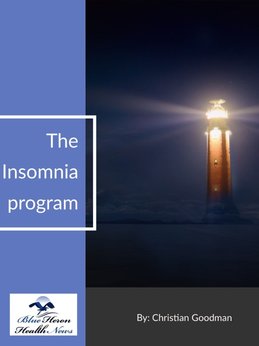
The Insomnia Program™ By Christian Goodman This program has been created by Christian Goodman, a natural health expert and sufferer of insomnia. He has used an audio program to let your fall sleep with the help of a bit of a hypnotic effect on your body.
What is insomnia?
Understanding Insomnia
Insomnia is a common sleep disorder that can make it hard to fall asleep, hard to stay asleep, or cause you to wake up too early and not be able to get back to sleep. It can sap not only your energy level and mood but also your health, work performance, and quality of life. Adult humans generally require around seven to eight hours of sleep per night. Many adults experience short-term (acute) insomnia, which lasts for days or weeks and is usually the result of stress or a traumatic event. Some people, however, suffer from long-term (chronic) insomnia that lasts for a month or more. Insomnia may be the primary problem, or it may be associated with other medical conditions or medications.
Symptoms of Insomnia
Insomnia symptoms may include:
- Difficulty falling asleep at night
- Waking up during the night
- Waking up too early
- Not feeling well-rested after a night’s sleep
- Daytime tiredness or sleepiness
- Irritability, depression, or anxiety
- Difficulty paying attention, focusing on tasks, or remembering
- Increased errors or accidents
- Ongoing worries about sleep
Causes of Insomnia
Insomnia can be caused by a variety of factors, including:
Stress
Concerns about work, school, health, finances, or family can keep your mind active at night, making it difficult to sleep. Stressful life events or trauma — such as the death or illness of a loved one, divorce, or a job loss — also may lead to insomnia.
Travel or Work Schedule
Your circadian rhythms act as an internal clock, guiding such things as your sleep-wake cycle, metabolism, and body temperature. Disrupting your body’s circadian rhythms can lead to insomnia. Causes include jet lag from traveling across multiple time zones, working a late or early shift, or frequently changing shifts.
Poor Sleep Habits
Poor sleep habits include an irregular bedtime schedule, naps, stimulating activities before bed, an uncomfortable sleep environment, and using your bed for work, eating, or watching TV. Computers, TVs, video games, smartphones, or other screens just before bed can interfere with your sleep cycle.
Eating Too Much Late in the Evening
Having a light snack before bedtime is OK, but eating too much may cause you to feel physically uncomfortable while lying down. Many people also experience heartburn, a backflow of acid and food from the stomach into the esophagus after eating, which may keep you awake.
Mental Health Disorders
Anxiety disorders, such as post-traumatic stress disorder, may disrupt your sleep. Waking up too early can be a sign of depression. Insomnia often occurs with other mental health disorders as well.
Medications
Many prescription drugs can interfere with sleep, such as certain antidepressants and medications for asthma or blood pressure. Many over-the-counter medications — such as some pain medications, allergy medications, and cold medications — contain caffeine and other stimulants that can disrupt sleep.
Medical Conditions
Chronic pain, cancer, diabetes, heart disease, asthma, gastroesophageal reflux disease (GERD), overactive thyroid, Parkinson’s disease, and Alzheimer’s disease are some of the conditions linked to insomnia. Dealing with these conditions can make it hard to sleep.
Sleep-Related Disorders
Sleep apnea causes you to stop breathing periodically throughout the night, interrupting your sleep. Restless legs syndrome causes unpleasant sensations in your legs and an almost irresistible desire to move them, which may prevent you from falling asleep.
Risk Factors
Nearly everyone has an occasional sleepless night. But your risk of insomnia is greater if:
- You’re a woman. Hormonal shifts during the menstrual cycle and in menopause may play a role. During menopause, night sweats and hot flashes often disturb sleep. Insomnia is also common with pregnancy.
- You’re over age 60. Because of changes in sleep patterns and health, insomnia increases with age.
- You have a mental health disorder or physical health condition. Many issues that impact your mental or physical health can disrupt sleep.
- You’re under a lot of stress. Stressful events and major changes can cause temporary insomnia. And major or long-term stress can lead to chronic insomnia.
- You don’t have a regular schedule. For example, changing shifts at work or traveling can disrupt your sleep-wake cycle.
Complications of Insomnia
Sleep is as important to your health as a healthy diet and regular physical activity. Whatever your reason for sleep loss, insomnia can affect you both mentally and physically. People with insomnia report a lower quality of life compared with people who are sleeping well. Complications of insomnia may include:
- Lower performance on the job or at school
- Slowed reaction time while driving and a higher risk of accidents
- Mental health disorders, such as depression, an anxiety disorder, or substance abuse
- Increased risk and severity of long-term diseases or conditions, such as high blood pressure and heart disease
Diagnosis and Treatment
If you think you might have insomnia, talk to your healthcare provider. They might ask you to keep a sleep diary for a week or two, so they can see your sleep patterns. They might also ask about your sleep habits, your medical history, and any medications you’re taking.
Behavioral Treatments
Behavioral treatments teach you new sleep behaviors and ways to make your sleeping environment more conducive to sleep. These techniques, called cognitive behavioral therapy for insomnia (CBT-I), are the first line of treatment for people with chronic insomnia. CBT-I helps you control or eliminate negative thoughts and actions that keep you awake. It includes:
- Stimulus control therapy: This method helps remove factors that condition your mind to resist sleep. For example, you may be coached to establish a consistent sleep-wake schedule and avoid naps, use the bed only for sleep and sex, and leave the bedroom if you can’t fall asleep within 20 minutes, returning only when you’re sleepy.
- Relaxation techniques: Progressive muscle relaxation, biofeedback, and breathing exercises are ways to reduce anxiety at bedtime. Practicing these techniques can help you control your breathing, heart rate, muscle tension, and mood so you can relax.
- Sleep restriction: This treatment reduces the time you spend in bed and avoids daytime naps, causing partial sleep deprivation, which makes you more tired the next night. Once your sleep has improved, your time in bed is gradually increased.
- Remaining passively awake: Also called paradoxical intention, this therapy for learned insomnia involves avoiding any effort to fall asleep. Worrying that you can’t sleep can keep you awake. Letting go of this worry can help you relax and make it easier to fall asleep.
- Light therapy: If you fall asleep too early and then wake up too early, you can use light to push back your internal clock. You can go outside during times of the year when it’s light outside in the evenings, or you can use a lightbox. Talk to your healthcare provider about recommendations.
Medications
Taking prescription sleep medications can help you get to sleep, stay asleep, or both. Healthcare providers generally don’t recommend relying on prescription sleep medications for more than a few weeks, but several medications are approved for long-term use.
Lifestyle and Home Remedies
You don’t need to endure sleepless nights. Consider these simple tips to help you get a better night’s sleep:
- Stick to a sleep schedule: Keep your bedtime and wake time consistent from day to day, including weekends.
- Stay active: Regular activity helps promote a good night’s sleep. Spend time outside every day.
- Check your medications: If you take medications regularly, check with your healthcare provider to see if they may be contributing to your insomnia.
- Avoid or limit naps: Naps can make it harder to fall asleep at night. If you can’t get through the day without one, try to limit it to 30 minutes and avoid doing it late in the day.
- Avoid or limit caffeine and alcohol and don’t use nicotine: All of these can make it harder to sleep, and effects can last for hours.
- Don’t put up with pain: If a painful condition bothers you, talk to your doctor about options.
- Avoid large meals and beverages before bed: A light snack is fine, but a large meal can cause discomfort and keep you awake. Drink less before bedtime to prevent waking up to urinate.
- Create a restful environment: Keep your room cool, dark, and quiet. Doing calming activities before bedtime, such as taking a bath or using relaxation techniques, might promote better sleep.
Conclusion
Insomnia is a complex condition with numerous potential causes and significant impacts on daily life. While it can be a challenging disorder to manage, understanding its causes, symptoms, and treatments can lead to effective strategies for improving sleep quality. If you are struggling with insomnia, it is important to consult with a healthcare provider to identify underlying causes and develop a comprehensive treatment plan.

The Insomnia Program™ By Christian Goodman This program has been created by Christian Goodman, a natural health expert and sufferer of insomnia. He has used an audio program to let your fall sleep with the help of a bit of a hypnotic effect on your body.